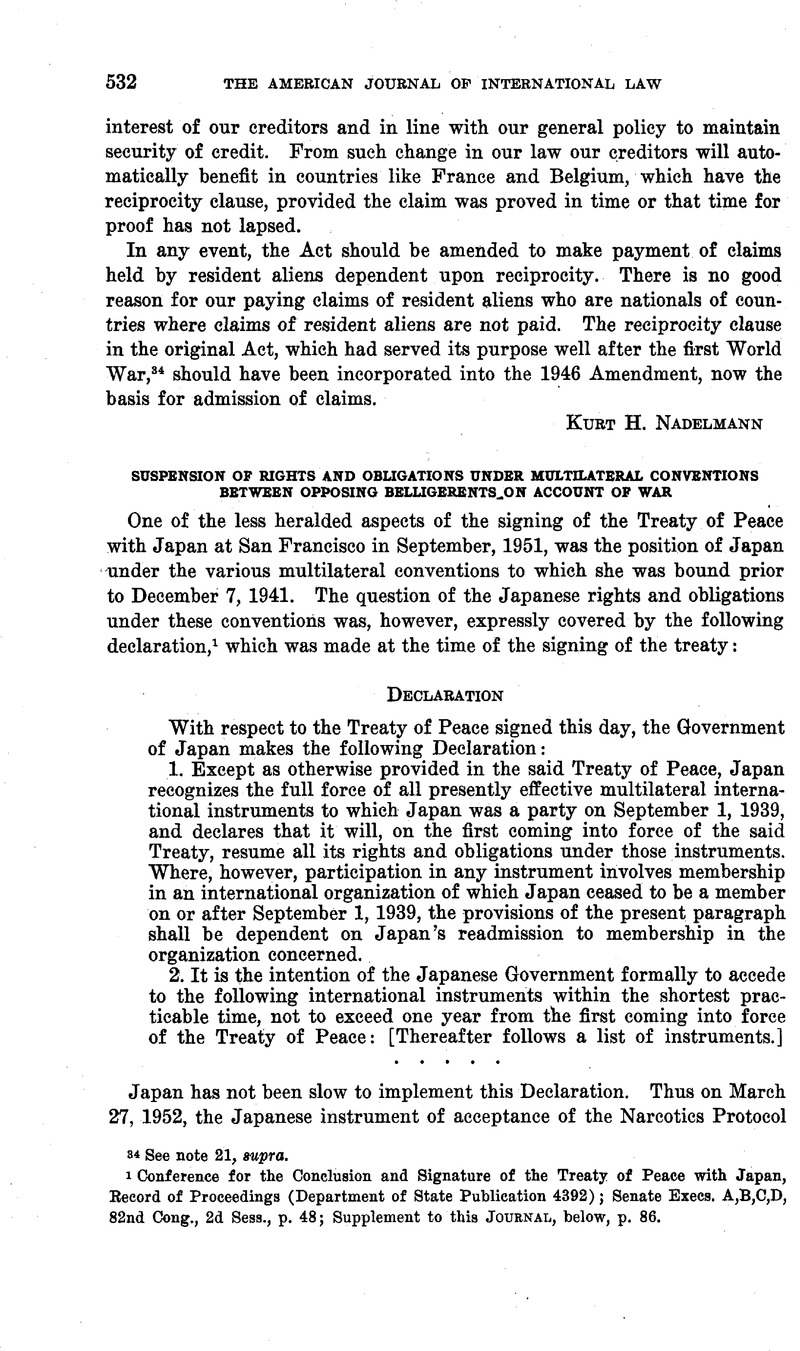No CrossRef data available.
Article contents
Suspension of Rights and Obligations Under Multilateral Conventions Between Opposing Belligerents on Account of War
Published online by Cambridge University Press: 20 April 2017
Abstract

- Type
- Current Notes
- Information
- Copyright
- Copyright © American Society of International Law 1952
References
1 Conference for the Conclusion and Signature of the Treaty of Peace with Japan, Record of Proceedings (Department of State Publication 4392); Senate Execs. A,B,C,D, 82nd Cong., 2d Sess., p. 48; Supplement to this Journal, below, p. 86.
2 Art. 282 et seq.
3 Treaties of Trianon (Art. 217 et seq.), Sèvres (Art. 269 et seq.), Neuilly (Art. 167 et seq.), Saint-Germain (Art. 234 et seq.).
4 June 1, 1952. However, there are provisions in the peace treaties for the revival of bilateral agreements. E.g., Art. 10 of the Treaty of Peace with Rumania, United Nations Treaty Series, Vol. 42, p. 3.
5 3 Documents of the Paris Peace Conference (C.P.) J.E., 6th meeting, p. 348. See also, Fitzmaurice, in Hague Academy Recueil des Cowrs, 1948 (II), pp. 259–364, at pp. 308–309.
6 It may be noted that the comment to the Harvard Research draft convention on the Law of Treaties (hereinafter cited and referred to as the Harvard Draft) prepared by the Research in International Law, Harvard Law School, this Journal, Supp., Vol. 29 (1935), p. 1200, takes the same view with regard to the provisions inserted in the Treaty of Versailles and other post-World War I treaties.
7 See Davis, “The Effects of War upon International Conventions and Private Contracts,” Proceedings of the American Society of International Law, 1912, pp. 124–132.
8 See Sir Cecil Hurst, “The Effect of War on Treaties,” British Year Book of International Law, Vol. II (1921–22), pp. 37–47, at p. 42.
9 It may not even be suspended as between belligerents and neutrals, but this is another question. See the Harvard Draft, loo. cit., p. 1198.
10 Op. cit., p. 122.
11 Ibid.
12 Cf. Art. 35 (c) of the Harvard Draft.
13 See Harvard Draft, loc. cit., p. 1200.
14 Cf. Hyde, in his International Law, Chiefly as Interpreted and Applied by the United States (2nd rev. ed., 1947), who, apparently writing before the publication of the Paris Peace Treaties, refers approvingly to the traditional procedure of inserting in peace treaties what multilateral conventions shall be regarded as still in force between the former belligerents.
15 Harvard Draft, loc. cit., p. 1183.
16 Loc. cit., p. 40.
17 This would seem to have been the method followed by the League Secretariat in connection with the Narcotics Agreements during World War II, referred to above. While, however, on the one hand, the very existence of the Secretariat may have been a factor in this instance, nevertheless it may be observed that Germany notified the Secretariat of its intention to suspend the application of these agreements during the war.
18 It would appear from the summary given in the New York Times of May 27, 1952 (this being the only available source to date), of the terms of the Contractual Arrangement signed at Bonn on May 26, 1952, between France, the United Kingdom and the United States on the one hand, and the German Federal Republic, on the other, that these do not contain any clause relating to the questions raised in the present note.
† The present note has been prepared as part of the research of the Mid-European Law Project, which is co-sponsored by the Library of Congress and the National Committee for a Free Europe, Inc. The Project is under the administration of Dr. Luther H. Evans, Librarian of Congress, and Dr. W. Lawrence Keitt, Law Librarian of the Library of Congress, and is under the supervision and editorship of Dr. Vladimir Gsovski, Chief of the Foreign Law Section.




